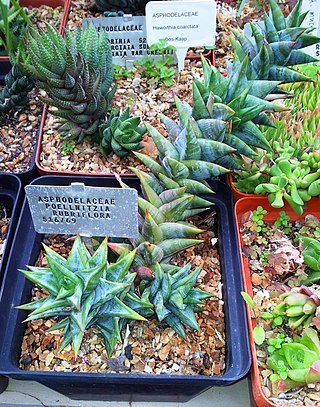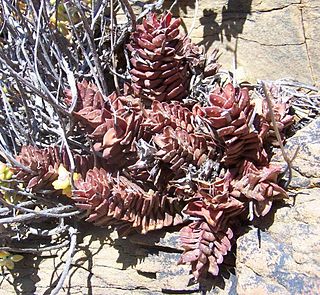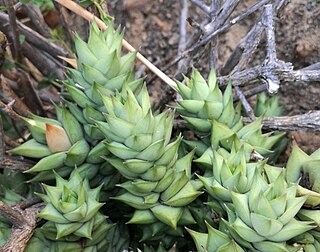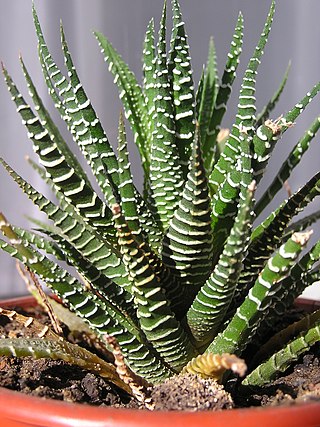
Asphodeloideae is a subfamily of the monocot family Asphodelaceae in the order Asparagales. It has previously been treated as a separate family, Asphodelaceae sensu stricto. The family Asphodelaceae has now been proposed to be a nomen conservandum, and the proposal has been recommended for ratification in 2017. In that case, Asphodelaceae will have priority over Xanthorrhoeaceae. This is reflected in the APG IV family lists.

Aristaloe is a genus of evergreen flowering perennial plants in the family Asphodelaceae from Southern Africa. Its sole species is Aristaloe aristata, known as guinea-fowl aloe or lace aloe.

Astroloba rubriflora is a succulent plant found in the mountainous Karoo area around Robertson, South Africa. It is listed as a Vulnerable species on the IUCN global Red List.

Astroloba is a genus of flowering plants in the family Asphodelaceae, subfamily Asphodeloideae, native to the Cape Province of South Africa.

Tulista is a small genus of succulent plants endemic to the Cape Provinces of South Africa. They were formerly included within the genus Haworthia.

Astroloba bullulata is a small succulent plant of the Astroloba genus, endemic to mountainous areas of the southern Cape, South Africa.

Astroloba corrugata is a small succulent plant of the Astroloba genus, endemic to the Little Karoo and the far south of the Western Cape, South Africa.

Astroloba spiralis is a small succulent plant of the Astroloba genus, endemic to the southern Karoo regions of the Western and Eastern Cape Provinces, South Africa.

Astroloba herrei is a small succulent plant of the genus Astroloba, restricted to the area around the Swartberg mountains, South Africa.

Astroloba congesta is a small succulent plant of the Astroloba genus, indigenous to the Eastern Cape, South Africa.

Astroloba foliolosa is a small succulent plant of the genus Astroloba widespread in the arid parts of the Eastern Cape Province, South Africa.

Kumara is a genus of two species of flowering plants in the subfamily Asphodeloideae, native to the Western Cape Province of South Africa.

Astroloba spirella is a small succulent plant of the genus Astroloba, restricted to an area of the western section of the Little Karoo, South Africa.

Astroloba robusta is a small succulent plant of the genus Astroloba indigenous to the arid southern Cape regions of South Africa. It is the most widespread Astroloba species.

Tulista minor is a species of succulent plant, from the far south of the Western Cape, South Africa.

Astroloba tenax is a succulent plant of the genus Astroloba, indigenous to the Western Cape Province, South Africa.

Gonialoe is a small genus of three succulent plant species, indigenous to South Africa, Namibia and Angola. They were formerly included within the related genus Aloe. The three species are Gonialoe variegata, Gonialoe sladeniana, Gonialoe dinteri.

Aloeae is a tribe of succulent plants in the subfamily Asphodeloideae of the family Asphodelaceae, consisting of the aloes and their close relatives. The taxon may also be treated as the subfamily Alooideae by those botanists who retain the narrower circumscription of Asphodelaceae adopted prior to the APG III system. Typically, plants have rosettes of more or less succulent leaves, with or without a distinct stem. Their flowers are arranged in racemes and tend to be either small and pale, pollinated by insects, or larger and more brightly coloured, pollinated by birds. As of 2017, 11 genera are recognized, most created since 2010 by splitting off another five genera from Aloe and another two from Haworthia. Only two genera, Aloe and Aloidendron, are native outside southern Africa, extending northwards to the Arabian Peninsula. Seven genera are restricted to South Africa, some with small ranges. Members of the Aloeae are cultivated by succulent plant enthusiasts; Aloe species especially are used in temperate climates as ornamental garden plants. Some species are used in traditional medicine. Aloe vera and Aloe ferox are cultivated for their extracts, whose uses include moisturizers and emollients in cosmetics.

Haworthiopsis is a genus of succulent plants in the subfamily Asphodeloideae. The genus was previously included in Haworthia. Species in the genus are typically short perennial plants, with leaves often arranged in a rosette and frequently having raised white markings. The two-lipped flowers are borne on a tall stalk and are small – less than 17 mm (0.7 in) long – and pale in colour. Many species are cultivated as house plants or by succulent enthusiasts.

Haworthiopsis × lisbonensis, formerly Haworthia lisbonensis, is an ornamental succulent plant, considered a hybrid of unknown parentage.




















